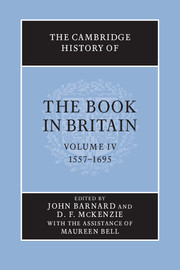Book contents
- Frontmatter
- Dedication
- Contents
- List of illustrations
- List of contributors
- Preface
- Acknowledgements
- Introduction
- RELIGION AND POLITICS
- ORAL TRADITIONS AND SCRIBAL CULTURE
- LITERATURE OF THE LEARNED
- LITERARY CANONS
- VERNACULAR TRADITIONS
- THE BUSINESS OF PRINT AND THE SPACE OF READING
- 26 Printing and publishing 1557–1700: constraints on the London book trades
- 27 The economic context
- 28 French paper in English books
- 29 The old English letter foundries
- 30 Bookbinding
- 31 Mise-en-page, illustration, expressive form
- BEYOND LONDON: PRODUCTION, DISTRIBUTION, RECEPTION
- DISRUPTION AND RESTRUCTURING: THE LATE SEVENTEENTH-CENTURY BOOK TRADE
- STATISTICAL APPENDICES
- Abbreviations
- Bibliography
- Index
- Plate Section
- References
28 - French paper in English books
from THE BUSINESS OF PRINT AND THE SPACE OF READING
- Frontmatter
- Dedication
- Contents
- List of illustrations
- List of contributors
- Preface
- Acknowledgements
- Introduction
- RELIGION AND POLITICS
- ORAL TRADITIONS AND SCRIBAL CULTURE
- LITERATURE OF THE LEARNED
- LITERARY CANONS
- VERNACULAR TRADITIONS
- THE BUSINESS OF PRINT AND THE SPACE OF READING
- 26 Printing and publishing 1557–1700: constraints on the London book trades
- 27 The economic context
- 28 French paper in English books
- 29 The old English letter foundries
- 30 Bookbinding
- 31 Mise-en-page, illustration, expressive form
- BEYOND LONDON: PRODUCTION, DISTRIBUTION, RECEPTION
- DISRUPTION AND RESTRUCTURING: THE LATE SEVENTEENTH-CENTURY BOOK TRADE
- STATISTICAL APPENDICES
- Abbreviations
- Bibliography
- Index
- Plate Section
- References
Summary
English printers depended on imported paper until the late seventeenth century, when the government began to encourage manufacturing ventures by granting monopolies, raising tariffs, and boycotting the nation’s economic enemies. A growing demand for printing paper and other economic incentives stimulated domestic production, but political measures were needed to protect it. For two hundred years the paper industry languished under pressure from foreign competition, mostly from across the Channel, where the production costs were lower and the distribution network was better organized. French mills dominated the English market, supplying far more than Italy, Germany, Holland, and the other exporting countries combined. These countries also shipped printing grades to London, but generally at higher prices and in negligible quantities except when Customs cut off French sources of supply.
Printers consumed so much French paper that they could name different types by the place of origin, like varieties of cheese. Normally they subsisted on ordinary printing grades manufactured in Normandy and Brittany, regions close enough to London to control the cost of transportation and far enough from Paris to contain the cost of labour. If times were hard, they might prefer the cheaper papers of Morlaix to those of Caen or Rouen. When they could afford it, they bought the produce of La Rochelle, but they also paid higher prices for shipments from Genoa, a leading entrepôt of paper in the pre-industrial period. On rare occasions, they might procure luxury goods from Holland to print large- or fine-paper copies for distribution to an author’s friends and patrons.
- Type
- Chapter
- Information
- The Cambridge History of the Book in Britain , pp. 583 - 601Publisher: Cambridge University PressPrint publication year: 2002
References
- 11
- Cited by

